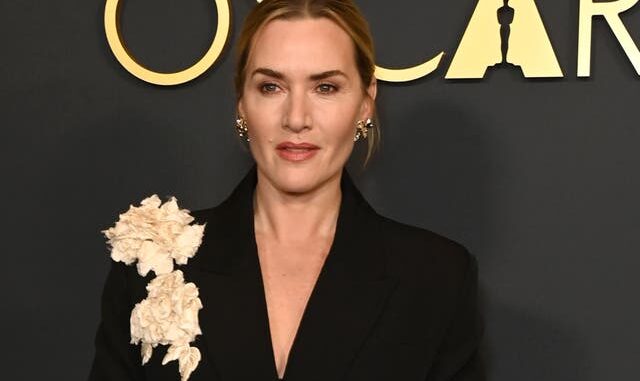
The year 1997 unfurled a cinematic phenomenon that would forever etch itself into the collective consciousness: James Cameron’s Titanic. Amidst the towering sets, the sweeping romance, and the tragic grandeur of the unsinkable ship, two young stars were launched into an orbit of fame so dazzling it bordered on the surreal. Leonardo DiCaprio, the charismatic rogue, and Kate Winslet, the fiery, defiant Rose DeWitt Bukater. Their love story, set against the backdrop of an impending disaster, captivated billions, transforming Winslet overnight from a promising British actress into a global icon. Yet, beneath the glittering surface of unprecedented success and universal adoration, a colder, more insidious current flowed – a torrent of harsh criticism that threatened to drown Winslet in the very fame that had propelled her to such heights.
For a 22-year-old Winslet, the initial ascent must have felt like a dream. Titanic wasn't just a movie; it was a cultural event, an emotional touchstone that transcended language barriers and demographic divides. Her portrayal of Rose, a woman yearning for freedom and passion, resonated deeply. She was beautiful, yes, but more importantly, she was real – her character embodying a spirit of independence that was both relatable and aspirational. The world fell in love with Jack and Rose, and with the fresh-faced actress who brought Rose to life.
But the sheer scale of Titanic's success brought with it an almost unbearable scrutiny, a microscope turned upon every aspect of Winslet's being. The whispers began subtly, then coalesced into a chorus, dissecting her nascent womanhood, deeming her "too fat," "imperfect," "not conventionally beautiful enough" for the fairytale. In an era before pervasive social media, the tabloids and entertainment shows became the arbiters of perfection, and Winslet, with her naturally curvaceous figure, often found herself the target of their cruel, body-shaming pronouncements. She wasn't the waif-like ideal of the 90s, and this apparent deviation was weaponized against her.
Looking back, Winslet has reflected on this period with a mix of raw honesty and hard-won wisdom. She recalls the ice-cold shock of encountering headlines that mocked her weight, the insidious effect of having her natural form deemed an inadequacy. For a young woman, still finding her feet in the tumultuous landscape of early adulthood, let alone global superstardom, these attacks were deeply wounding. They were not just critiques of her acting, but of her very person, stripping away the joy of her achievement and replacing it with a gnawing self-consciousness. "I was getting the living daylights knocked out of me," she candidly expressed years later, remembering the torrent of personal judgment that overshadowed her professional triumph.
The harshness extended beyond her physical appearance. There was an undercurrent of questioning her legitimacy, an implication that her success was merely a fluke of casting or the accidental chemistry with DiCaprio. The media narrative often reduced her to "Leo's leading lady," subtly undermining her talent and agency. This relentless deconstruction, both of her body and her worth, created a profound sense of isolation and bewilderment. How could a film that had brought so much beauty and emotion to the world simultaneously inflict such personal pain?
Yet, it was in this crucible of public scrutiny that Winslet's formidable resilience began to forge itself. Rather than succumb to the pressure to conform, to diet herself into the industry's prescribed mold, she chose a different path. She retreated from the most glaring lights of Hollywood, carefully selecting roles that showcased her versatility and depth, often in independent films and character-driven dramas. She chose grit over glamour, substance over superficiality. Films like Holy Smoke!, Quills, and eventually her Oscar-winning turn in The Reader, became testaments to an unwavering commitment to her craft, proving her talent far beyond the shadow of the Titanic.
Through the decades that followed, Winslet’s stance hardened into an unflinching advocacy for body positivity and self-acceptance. She became a vocal critic of the unrealistic beauty standards imposed on women, particularly in the public eye. Her own experiences, though painful, transformed into a powerful platform. She understood, intimately, the damage such criticism could inflict, and vowed to protect herself and future generations from it.
Kate Winslet’s reflection on the harsh criticism she faced after Titanic is more than a personal anecdote; it’s a poignant commentary on the price of fame, the cruelty of objectification, and the enduring power of the human spirit. It serves as a stark reminder that behind every cinematic triumph lies a human being, vulnerable and susceptible to the judgment of millions. But it also illustrates the profound strength that can emerge from adversity – the courage to stand firm against the current, to define one's own worth, and ultimately, to navigate the choppy waters of celebrity not as a victim, but as a survivor and an inspiration. Her legacy, far grander than any box office record, is built on talent, tenacity, and an authentic spirit that refused to be diminished.